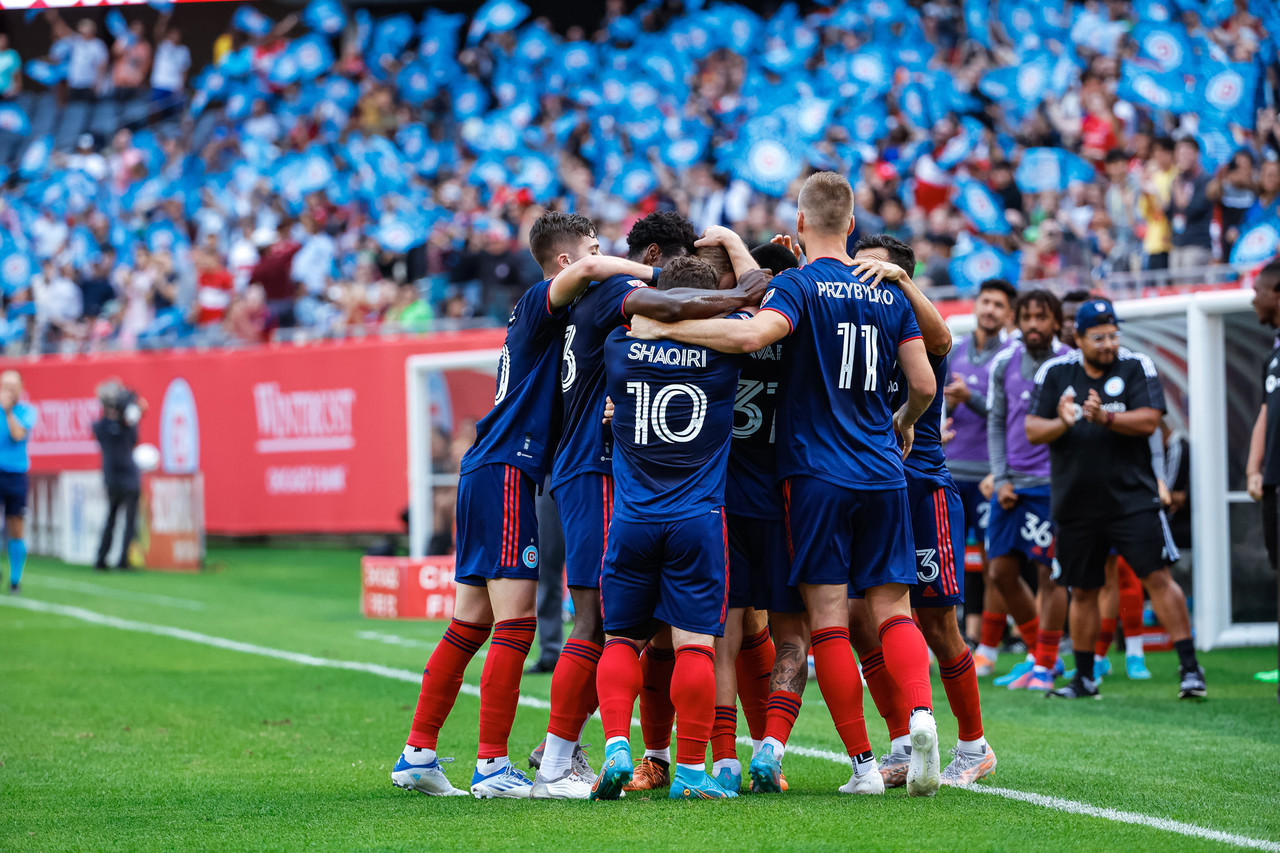“Just when I thought you couldn't get any dumber, you go and do something like this... and totally redeem yourself!”
That quote may be from classic Hollywood comedy Dumb and Dumber, but it kind of sums up how Chicago Fire fans currently feel about their team.
Going into the start of last week, the club were set to encounter their most important stretch of the season. They had three home games in the span of eight days, with two coming against Eastern Conference rivals while the other was versus the reigning CONCACAF Champions League winners.
The first of the games could not have gone any worse. Despite Chicago taking a 2-0 lead into halftime against the Columbus Crew, they still managed to lose, as some changes at the break by the opposition led to them scoring three unanswered. It was a nightmarish day at the office, and many thought it was the final nail in the coffin in terms of the team’s season.
Then came the midweek match versus Toronto FC. The Fire made an even faster start to this contest, scoring twice in the opening 16 minutes to jump in front. This time they held on, absorbing pressure on the way to a relatively simple win.
A good way to bounce back, sure, but it wasn’t the toughest test in the world considering how poor the Canadian outfit had been beforehand. Chicago hadn’t been truly challenged.
That was until the final match. Up against MLS powerhouse the Seattle Sounders, the Fire weren’t expected to take anything from the contest. However, they only went and secured all three points after a resilient 1-0 victory, surprising the rest of the league in the process.
Just like that Chicago were back in the picture. They were only three points off of the final playoff spot in the East at the end of the night, and there was a newfound sense of hope surrounding the club.
So, what’s gone right for Chicago? How have they saved their season in the nick of time to give themselves a chance again? Well, it’s a little bit of the old, and a little bit of the new.
Defensive stability
First, the old.
Looking back to the start of the campaign, the Fire were actually one of the better teams in the league. Nine points from the opening five games was impressive, sure, but what really set the side apart was the fact that they had only conceded once during that span. As a result, they hadn’t trailed for a single minute.
Were there issues going forward? Sure, but those could be fixed later on. What mattered was that Chicago were becoming incredibly hard to beat, and that they were developing quite the formula for success.
That all changed very quickly, of course. There was a brutal five game stretch where they conceded 14 goals. Goalkeeping phenom Gabriel Slonina was starting to look like a kid in a man’s league, and he wasn’t getting any help from those in front of him. Everything had fallen apart at the back, and the attack's uselessness going forward meant that the team went months without a win.
A middle-ground of sorts had been found following that point, but a collapse at home against rivals the Columbus Crew flung Chicago back to rock bottom. It seemed like the year was already over, and that the team had reached a point of no return.
However, instead of giving up and giving in, the Fire fought back. They returned to the basics, focusing on the defense and making it tough for the opposition to even create a chance. They were given a boost against Toronto FC when Jhon Durán scored twice early on, giving the team a lead to protect.
That’s exactly what they did, sitting a bit deeper than usual and absorbing pressure instead of trying to play against it. Everything went well, and Chicago never really came close to conceding by the end of the night. However, there were still some doubts about the performance since it came against a woeful Toronto outfit.
The Fire then did the same against the Seattle Sounders that weekend. This challenge was obviously much tougher, and they did give up a few opportunities throughout the contest. By the full-time whistle, though, the likes of Jordan Morris, Nicolás Lodeiro, and Albert Rusnák had failed to create a real clear-cut opening, so the clean sheet and the three points went to the hosts.
Almost everyone has stepped up for Chicago at the back. Carlos Terán had stopped making mistakes, which allowed his incredible pace and strength to win him challenge after challenge. Jonathan Bornstein came into the left-back position to fill in for the suspended Miguel Navarro and decided to make the spot his own. The 37-year-old played the full 90 minutes in back-to-back games in the span of four days, and he didn’t even look that tired when all was said and done. Then there's Gabriel Slonina, who was back to his best, showcasing why he’s the prodigy that he is.
They all were great, sure, but Rafael Czichos was simply on another level. The centerback was practically perfect these two games. He made every tackle, he won every aerial duel, and he did this all while leading the side as club captain. He was even superb in possession. The number 5 has taken charge of things at the back, and the best compliment you can give the player is that he seems too good for this level sometimes.
With all that coming together, the Fire might just be a team that’s hard to beat again.
Offensive fluidity
Now for a bit of the new.
See, all that defending doesn’t matter if Chicago can’t find the back of the net. A 0-0 result is a good one sometimes, but too many of those will knock you right out of playoff contention. They needed to find out a way to grab at least a goal a game, and fast.
Fast is exactly what they decided to do. The Fire started playing faster, moving the ball up the pitch at a greater speed than before. Instead of keeping possession and patiently passing it around in search of an opening, the team decided to just go for it almost all the time.
When the backline wins the ball, they’ll lump it up to one of the attacking four. They’ll then either turn forward themselves or lay a pass off to a midfielder, who will then play a streaking runner through in behind the opposition defense. It all happens very quickly, and it leads to some exciting moments.
This was on show against Toronto, who fortunately decided to play one of the highest defensive lines ever seen. Jhon Durán, starting in place of the struggling Kacper Przybyłko, took off in a full sprint nearly every single time Chicago won the ball. It worked perfectly, as he found himself 1v1 with the goalkeeper on two separate occasions early on. He was able to finish off both, which gave his side a crucial lead.
No more goals were scored, but the Fire were able to carve out some more openings before the contest was over. It was more of the same versus Seattle, with most of their chances in that game coming via the counter.
Their lone strike in that match did not come on the break, which leads to the other change made to the attacking gameplan. Chicago, as of late, has been a much more fluid team going forward.
For most of the season, the positions were kind of set. Xherdan Shaqiri was playing up the middle, and the two wingers alongside him stayed out wide. The two center midfielders behind them stayed behind them, focusing on protecting the backline instead of supporting the front four.
That’s no longer the case. Shaqiri still starts up the middle, sure, but he now has the freedom to venture to either wing whenever the opportunity arises. When he does that, winger Brian Gutiérrez then comes centrally to fill up the vacated space. (He’s been brilliant at times, but expect Jairo Torres to take up this role when he’s fully fit.) Chris Mueller usually stays on the wing, but he’s able to both cut inside and go out wide when on the ball, which gives the Fire a new dynamic in the final third.
They’re not the only ones who are allowed to move around more. In terms of the center of midfield, Gastón Giménez and Mauricio Pineda still play deeper, but Federico Navarro has been given lease to venture forward. Sometimes he’s the furthest player up the pitch, but usually he’s hovering around the top of the box. That’s where he found the back of the net against the Philadelphia Union a few weeks ago.
There’s even more fluidity at striker. Gone are the days of old when Przybyłko would drop deep and try to link up play, leading to pass after pass after pass. Instead, Chicago now has Durán’s aforementioned running in behind to threaten the opposition instead. Even when Przybyłko had to cover for the injured Durán, he was making more runs than before.
It all came together versus Seattle. Just look at the lone goal of the game. The aforementioned Fede Navarro picked up the ball in midfield, and he took a touch before lofting a cross into the area. Who did he pick out? Starting striker Przybyłko? One of the rest of the front four? Nope.
The correct answer is centerback Rafael Czichos. He had mainly stayed up following a set-piece, sure, but the linkup epitomized the new way the Fire were playing. Anyone could pitch it at any time, and the chaos helped the team create and score more, or score enough at least.
The road ahead
All in all, things are looking up for Chicago.
They’re solid at the back again, and they’re somewhat threatening going forward. They’ve won four out of their last seven, which has put them only four points behind the final playoff spot in the Eastern Conference. Life is alright.
The only problem is that their next game is an away one. Everyone knows how historically bad the Fire are on the road, and even though they won their first away game of the campaign, they’ve not won another since. They do return home for a match against fellow postseason contenders Atlanta United, but that’s followed by another two contests on the road.
It seems like we’ll know a lot more about this Chicago team once that spell is over. Have recent changes actually improved results, or have these past few wins just been flukes that coincidentally happened in a short span? Are they good, or are they just gaslighting the fanbase again?
Only time will tell, but a victory or two on the road would go a long, long way in cementing the Fire as a legit threat again.










































